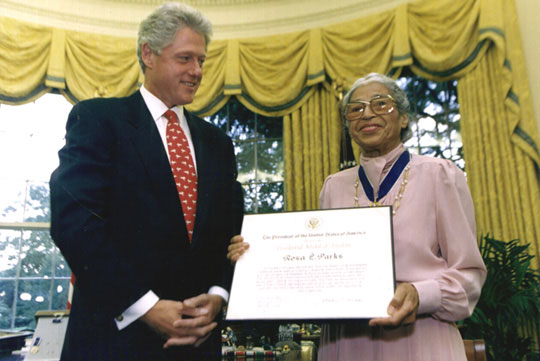Winner of the Fall 2017 StMU History Media Award for
Best Article in the Category of “Social History”
Rosa Parks, a strong, independent Civil Rights Activist, stood up for what she believed in. She’s known for her courageous acts dealing with the Montgomery Bus Boycott and the early phase of the Civil Rights Movement in the 1950s. But what happened in her life after these important events?
As we know, Rosa Parks was arrested for not giving up her seat on a Montgomery bus in 1955. She entered the bus, saw that it was quite crowded with one seat available located in the front “Whites Only” section of the bus. As more passengers boarded the bus, the bus driver demanded that he needed the seat Rosa was sitting in. She refused, and she was arrested.1

After her arrest on that December 1, 1955, Edgar Nixon, another Civil Rights Activist, paid her one-hundred-dollar bond. Immediately following her bail, she proceeded to file a lawsuit against the National City Lines bus company for its segregation practices. After weeks and weeks of this being an active case, the judges finally concluded. The court ruled bus segregation to be unconstitutional. The year-long Montgomery Bus Boycott finally came to a victorious end in Alabama in December 1956.2 During the boycott, Parks was invited by the United Auto Workers Union (UAW) to come to Detroit to speak to the union’s members. Local members of the UAW even raised the money to bring Rosa in. She stayed at the Garfield Hotel because blacks were not allowed to enter or reside at any downtown hotels. The mayor of the suburb of Dearborn had made his views on segregation clear: “Negroes can’t get in here. . . These people are so anti-colored, much more than you in Alabama.”3 Rosa Parks speech about the Montgomery boycott had a great impact on the UAW membership in Detroit.
Rosa Parks became an icon of the Civil Rights Movement. Her leadership skills and perseverance led to multiple doors opened for her, although at first she and her husband found getting employment difficult. In 1957, Rosa Parks moved to Detroit where her brother Sylvester lived. In 1964, Parks helped John Conyers campaign for Congressman, fighting for “jobs, justice, and peace” for Michigan’s first Congressional District. Certain laws prohibited some of Detroit’s residents from voting. Rosa was able to help Conyers win the election by obtaining the help of Martin Luther King. With King’s endorsement, Conyers won by a margin of 84%. Conyers then hired Rosa Parks as his secretary and receptionist, a position she held until 1988. Her daily tasks included dealing with issues such as, education, housing, and segregation.4

The Detroit that Rosa Parks moved to in 1957 was highly segregated. After World War II, Virginia Park, the historic district of Detroit where Parks lived, had become overcrowded, like many other sections of Detroit where African Americans were restricted. The district was further disrupted by the building of a highway, requiring the relocation of 43,000 citizens of Detroit, 70% of whom were African American. This led to increased frustration by Detroit’s African-American population, who were denied access to Detroit’s suburb housing, but told that Detroit was “colorblind” when it came to housing discrimination.5 When blacks attempted to move into the white suburban areas, realtors discouraged them and banks were very hesitant to make housing loans to them. If they succeeded, violence typically followed. By 1963, black citizens began to protest these closed housing practices. On June 23, 1963, Rosa Parks and Martin Luther King joined to lead Detroit’s Great March to Freedom to protest these unfair housing practices. This march drew a crowd over 200,000 people.6
Rosa also recognized that inner-city black students in Detroit, as elsewhere, didn’t receive the kind of preparation in their public schools to go to college. Growing up, Rosa herself barely had the opportunity to attend school, let alone college. With the assistance of Representative John Conyers, she raised government funds to open the Rosa L. Parks Scholarship Foundation. This Foundation gives Michigan high school seniors the opportunity to pursue a college education when they exemplify the ideals of demonstrating academic skills, community involvement, and economic need. This has been very beneficial for hundreds of students from poor Michigan communities since its founding in 1980. Although the process of creating this scholarship was very rigorous, Rosa was able to accomplish this goal.2
On October 24, 2005, Rosa Parks died from natural causes. She is still recognized to this day for her courageous acts.8
- Julie Bosman, Once A Stop for Rosa Parks (New York: The New York Times, 2016), 2-3. ↵
- Julie Bosman, Once A Stop for Rosa Parks (New York: The New York Times, 2016), 2-3. ↵
- Jeanne Theoharis, “The Northern promised Land that wasn’t: Rosa Parks and the Black Freedom struggle in Detroit,” OAH Magazine of History Vol. 26 No. 1 (2012): 23-24. ↵
- Jeanne Theoharis, “The Northern promised Land that wasn’t: Rosa Parks and the Black Freedom struggle in Detroit,” OAH Magazine of History Vol. 26 No. 1 (2012): 22-25. ↵
- Jeanne Theoharis, “The Northern promised Land that wasn’t: Rosa Parks and the Black Freedom struggle in Detroit,” OAH Magazine of History Vol. 26 No. 1 (2012): 24. ↵
- Jeanne Theoharis, “The Northern promised Land that wasn’t: Rosa Parks and the Black Freedom struggle in Detroit,” OAH Magazine of History Vol. 26 No. 1 (2012): 24. ↵
- Julie Bosman, Once A Stop for Rosa Parks (New York: The New York Times, 2016), 2-3. ↵
- Brinkley Douglas, Rosa Parks: A Penguin Life (New York: Penguin Books, 2000), 27-35. ↵


53 comments
Ernie Sano
Usually, the story of Rosa Parks is the same rehash of events and facts yet you managed to cover her story really well and maintain an engaged tone throughout the whole article. If anyone needed to learn more about her, I would refer them to your article because it’s important that people understand who she was and why she is an important figure in American history. Thank you!
Alejandra Chavez
I’ve always had the upmost respect for this woman and I aspire to one day have such a societal impact that one day I might be in the same sentence as her when someone is talking about positive influence. This article was very informative and allowed me, the reader, to find a sense of encouragement to not be intimidated by the societal constructs I face today. Its amazing how a single drop can make such an effect on a pond. Great article.
Eduardo Foster
Rosa Parks is actually an amazing person with a lot courage for what she did. She did not matter and always stood for what she thought it was justice. Even though she went to jail she actually was important piece for the civil rights movement. I like how the story is narrated. Great article and keep it up with the good work!
Deanna Lummus
Rosa Parks is no doubt one of my absolute idols. She stood up for what she knew in her heart was the right thing to do. To have her right be taken away by the acts of who were in power at the time, she never wavered and that s why we all know her name today. I always admired her and her own ways of doing things which were incredibly successful. Being arrested for something we all see as normal today speaks volumes to just how important everyday actions we take as human beings can be on the rest of the world and how they can positively affect those around us. I knew her story well but I didn’t know that soon after her arrest Edger Nixon paid her bail money and got her out. Great article!
Andrea Chavez
Rosa Parks is such an inspiration to women of all types; specially the ones who are into the civil rights movement. Thanks to Parks there were so many changes for people with color be it man or women. The bravery and courage it took to do all that she did is incredible, if all women were like that I’m sure women would dominate the world.
Angela Rodriguez
Rosa Parks continues to be an inspiration to not only African Americans but to all of us. Throughout school, we knew the story of Parks refusing to get out of her seat on the bus. Like, myself included that was pretty much the extent of it, by reading this article I learned many new things that she was able to accomplish after those events occurred. Rosa Parks will continue to be an influential role model for years to come.
Lauryn Hyde
Well written article about such an important woman who contributed so much towards the movement towards equality. She made such a huge movement by something that at the time seemed to small, not giving up her seat on the bus. Without this small protest, who knows how fast the movement towards equality would have started. It is interesting the way the article goes into detail about her life after her arrest and how she got the recognition she well deserved.
Cameron Ramirez
I am pretty sure everyone knows the remarkable and exceptional woman Rosa Parks. She is probably one of the most iconic and memorable women in civil rights history in the United States. This article was a great read. I enjoyed the set up of your article since it went over much of what she did. Anyway, good work on this article on the memorable Rosa Parks, she is such an extraordinary woman who stood up and did something.
Brianda Gomez
I really enjoyed reading this article and learning more about the brave and incredible women named, Rosa Parks. She was well-known for the Montgomery-bus-boycott and breaking the rules to stand up for what she believed in. Her actions lead the way to open many doors for other black citizens just like herself. Her perseverance to make a change in the world attracted many individuals who went a long fighting to put an end to segregation.
Karina Nanez
Rosa Parks was truly an iconic woman, she stood for civil rights and education equality during a time when the color of your skin dictated how successful you were and where you lived. I remember learning about her in school and being surprised that all it took to change the course of history was the simple act of her saying “No.”